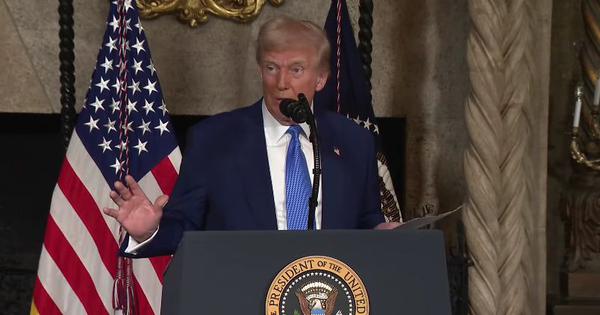
United States President Donald Trump on Friday reiterated his claim of helping settle the tensions between India and Pakistan, stating that his talks with both nations were a “bigger success” than he will be given credit for.
In an interview to Fox News, Trump claimed New Delhi and Islamabad harboured “great hatred” toward each other and tensions had escalated to the point where a nuclear conflict seemed possible.
Since May 10, this is the seventh time that Trump has claimed that the US brokered the ceasefire between India and Pakistan – an assertion that India has pushed back against.
India has maintained that “the issue of trade did not come up” in any discussion between Indian and US leaders.
Besides, India’s External Affairs Ministry spokesperson Randhir Jaiswal on Tuesday also said military action from India’s side was “entirely in the conventional domain” in response to Trump’s speculation about nuclear war.
Despite this, Trump on Friday said: “And the next phase was probably, did you see where it was getting. It was tit for tat. It was getting deeper and more, I mean, more missiles, everyone was ‘stronger, stronger’.”
“So to a point where the next one’s going to be, you know what?” he asked. “You know the N word is, right?”
The interviewer replied: “Nuclear”.
On May 10, Indian Foreign Secretary Vikram Misri announced the decision to stop military action minutes after Trump claimed on social media that India and Pakistan had agreed to the ceasefire. The US president had claimed that the ceasefire talks were mediated by Washington.
US Secretary of State Marco Rubio had claimed on social media that New Delhi and Islamabad had agreed to “start talks on a broad set of issues at a neutral site”.
However, the Indian Ministry of Information and Broadcasting had said that the decision to stop the firing was “worked out directly between the two countries”.
“There is no decision to hold talks on any other issue at any other place,” the ministry added.
The tensions between New Delhi and Islamabad had escalated on May 7 when the Indian military carried out strikes – codenamed Operation Sindoor – on what it claimed were terrorist camps in Pakistan and Pakistan-occupied Kashmir.
The strikes were in response to the terror attack in Jammu and Kashmir’s Pahalgam, which killed 26 persons on April 22.
The Pakistan Army retaliated to Indian strikes by repeatedly shelling Indian villages along the Line of Control in Jammu and Kashmir. At least 22 Indian civilians and eight defence personnel were killed.
Pakistan claims 11 of its military personnel and 40 civilians were killed.
Trump repeats claims on tariffs
On Friday, the US president also said he was “using trade to settle scores and to make peace”.
“India… they are one of the highest tariff nations in the world, they make it almost impossible to do business,” he said once again during the interview. “Do you know that they’re willing to cut 100% of their tariffs for the United States?”
He claimed that India “wants to make a deal” with the US.
India’s External Affairs Minister S Jaishankar had on Thursday reiterated that “any trade deal has to be mutually beneficial”, ANI reported.
Noting that these were “complicated negotiations”, the minister said: “Nothing is decided till everything is.”
Trump’s so-called reciprocal tariffs imposed on several countries, including a 26% “discounted” levy on India, took effect on April 9. Hours later, however, Trump had reduced the rates on imports from most countries to 10% for 90 days to provide time for trade negotiations.
The US president had repeatedly said he intended to impose a reciprocal tax on India, among others, citing high tariffs the countries impose on foreign goods.
The tariffs had led to concerns of a broader trade war that could disrupt the global economy and trigger recession.
The Indian government has said that it is in talks with Washington to finalise a bilateral trade agreement between September and November.
Trump’s remarks on Friday came a week after India notified the World Trade Organization that it may impose retaliatory tariffs on the US after Washington increased the import duties on aluminium and steel to 25%.
India’s levies may take effect a month from the date it notified the World Trade Organization.
New Delhi said that the actions were safeguard measures.
Also read:

